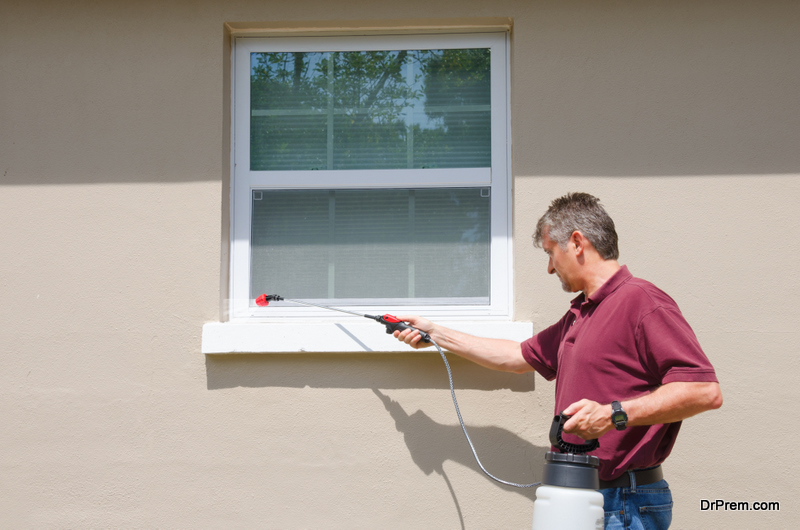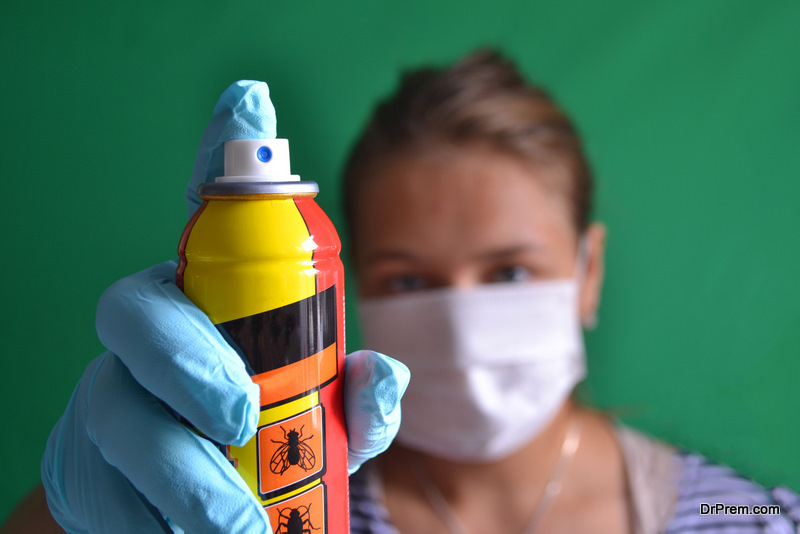Most homeowners who believe they have a pest problem head to their local hardware store to load up on sprays, traps, baits, and more to handle the problem themselves. While DIY pest control methods can mitigate a few pests in your home, you may be wondering if they work as well as professional pest control. There’s no question that professional pest control treatments are more effective, but they’re not always necessary, particularly if you have a small pest problem.
Before we dive into the pros and cons of DIY pest control, here are two different types of pest control methods:
DIY Pest Control Methods
 1. Chemical Pest Control
1. Chemical Pest Control
This method of pest control focuses on killing or preventing pests with the use of substances or chemicals. This can include insecticides, rodenticides, or more. Trained professionals use chemical pest control to kill pests and keep families safe.
2. Physical/Mechanical Pest Control
This pest control method focuses on removing pests with the use of wires, bars, traps, or hands. Some homeowners even use heat or steam sterilization of soil to control soil-borne pests and diseases. Floating row covers over vegetable crops can also effectively prevent the entry of pests.
3. Preventative Pest Control
When controlling household pests, prevention is crucial. The most common preventative DIY pest control methods include, cleaning up and spills or crumbs, keeping your home dry, sealing entry point with caulk, maintaining your yard, and using plants as natural repellents.
Here’s a look at the pros and cons of DIY pest control.
DIY Pest Control Pros
1. Cost
The more significant benefit of DIY pest control is the cost, which is enticing for homeowners on a budget. A quick trip to the store for the required products will typically cost you $20 to $100 per insecticide container, depending on type and size. The average cost for professional pest control is $250, which typically includes a trained pest exterminator, effective, conscientious treatments, full property inspection and service, and re-services if necessary.
2. Convenience
In addition to affordability, DIY pest control is also more convenient and readily available. All you need to do is drive to the store, purchase the insecticide of your choice, and use them the same day. When you call a professional pest control company, you’ll need to coordinate both of your schedules to find a time for the inspection and pest control services.
3. Easy Application
Most store-bought insecticides offer easy-to-follow instructions that allow you to apply the product appropriately. All you’ll need to do is spray or sprinkle on the problem area.
DIY Pest Control Cons
 1. Safety
1. Safety
Unfortunately, most store-bought pest control products contain hazardous chemicals that can harm you, your family, and your pets. Not only do these treatments pose a threat to humans, but studies have also shown that pesticides can continue to live in the environment for years, throwing off the balance of the ecosystem. We can already see the impact of this imbalance happening around the world.
In fact, pesticide use has been connected to diminishing populations of honeybees. Pesticides are also killing off several other advantageous animals as well, including butterflies and hummingbirds.
This confirms the increasing importance of environmentally friendly pest control in order to reverse these damaging consequences. Fortunately, professional pest control treatments are becoming more and more eco-friendly and healthy. Plus, technicians are familiar with their use and applications and can apply them with the utmost safety protocols.
2. Effectiveness
The main goal of pest control treatments (in addition to safety) is to be effective. DIY treatments tend to be effective for minor pest problems but aren’t ideal for more significant issues. In most cases, these treatments need to be applied more than once and are better for pest prevention than spot treatments. Plus, pests can become resistant to the chemical in store-bought products. When you hire a pest control exterminator, they’ll typically perform a full inspection that also includes a flushing treatment, killing 70 to 80 percent of the adult pests in your home. A reputable company will also return within 30 to 45 days to kill any hatched eggs and surviving pests and then visit every quarter.
Your home will be fully protected, treating your foundation with a power sprayer using a unique micro-encapsulated product that doesn’t wash away in the rain. These visits are generally done on the exterior of your home, but the pest exterminator should also examine and treat the inside of your home as needed.
3. Expertise
To eliminate your pest problem, you need to properly identify the species, which can be challenging to accomplish if you’re not trained and experienced in pest control. While DIY pest control products have instructions that make them easy to use, professionals know the ins and outs of each type of pest, including their appearance, behaviors, hiding spots, and how to treat them.
4. Warranty
Your DIY pest control product may come with a warranty, depending on the manufacturer. If not, you’ll most likely incur more cost and will have to deal with the damages further caused by the pest infestation. Most pest control companies offer a guarantee, so if the bugs they exterminate return, they’ll come back again (for free). You won’t have to shell out more money for additional extermination.
DIY or Professional Pest Control: Which One is Right For My Home?
Although DIY pest control is the more affordable option, seeking the help of a professional exterminator is necessary if the pest infestation is severe and difficult to treat. You should also consider calling the experts if your DIY pest control efforts have failed. This may be a sign to switch up your treatment method for something more effective.
In the end, deciding whether to take a do-it-yourself approach to pest control or call in the pros is a personal decision. If you have a pest problem that has gotten out of control and your home requires professional attention, it may be time to contact a licensed and professional pest control company that can thoroughly inspect your home and provide you with a comprehensive treatment and prevention plan.
Article Submitted By Community Writer


